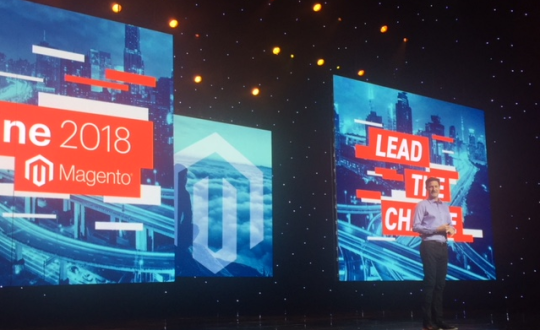By Glenn Taylor, Senior Editor

While the Retail
TouchPoints team is gearing up for next week’s 2018 Retail Innovation Conference in New York City, I had the
opportunity to attend two user conferences this week in Las Vegas — Magento Imagine and NetSuite SuiteWorld. While we’ve
discussed the concept of a “retail
transformation” ad
nauseum over the past year, wholesale also is undergoing its own
transformation.
Although RTP
focuses on how retailers can bolster their customers’ experience, I noticed a number
of sessions and in-person meetings at the two conferences that actually touched
on the world of a somewhat different audience: B2B buyers. But the crossover felt very relevant, especially since
it appears B2B wholesalers can learn a thing or two from their retail
counterparts. In some cases, companies that function as both retailers and
wholesalers, and that seek to excel in both areas, can leverage practices on
the retail side to benefit their B2B operations.
As many as 75% of B2B companies have customers who
have asked if they can purchase from them online, according to a survey
from Sana
Commerce. Among companies that already have a B2B-specific web store, 76% are planning to upgrade it within two
years — an indication that digital transformation is still a work in progress
for many companies.
Intelligentsia
Coffee, Sugarfina Show That Retailers Must Treat B2B Buyers Like Retail Shoppers
Both conferences included examples of the benefits of
serving every channel in retail — including wholesale. While B2B buyers
often aren’t associated with typical “shoppers,” since they often order
merchandise in bulk and traditionally have conducted transactions over the
phone, they’re still shoppers at heart. It makes very little sense for them to
have to make purchases on outdated web sites and platforms, or have limited
merchandise to select from.
This means retailers with wholesale businesses must optimize
their B2B experiences in the same way customer-facing e-Commerce sites have
been redesigned in recent years.
During the Imagine event, Matt Riddle, Director of
E-Commerce at coffee roasting company Intelligentsia
Coffee, shared that wholesale is approximately 75% to 80% of his company’s business, despite operating more than
15 coffee shops, an e-Commerce site and a subscription model. Yet the company
still continues to expand its product offerings, diversifying what it can sell
to independent coffee shops, restaurants and other independent businesses.
“We’re now launching into cold coffee,” Riddle said in an
interview with Retail TouchPoints.
“We have a cold coffee solution that we’re expanding our SKUs in, and we’re
also working on moving into the ready-to-drink space, which is already a very
popular segment in the coffee beverage industry. It’s pretty crowded and we’re
not the first-to-market so we’re trying to make some headway with these
products.”
Another example of retail’s impact on B2B comes from an
unlikely source — luxury candy boutique Sugarfina. To close out my time at SuiteWorld, I sat in on a
roundtable with Danny Coorsh, Senior Director of Operations at Sugarfina, where
he shared the shared the company’s origins, business growth and channel
strategies. Sugarfina sells in just about every channel you can imagine, with
26 of its own branded stores in North America (including one at The Shops at Columbus
Circle, where it will be a part of the RIC Store Tours)
plus pop-in shops in department stores such as Nordstrom and Neiman Marcus.
While the company’s current goals are to open 10 to 12
stores per year, with a particular focus on breaking ground internationally,
Sugarfina also has built out a growing B2B presence on top of its B2C business.
The retailer is no stranger to innovating and trying new concepts, with Co-Founder
Rosie O’Neill speaking at RIC on successfully disrupting
traditional product categories. The lifestyle brand launched its B2B
e-Commerce site in only 21 days via SuiteCommerce Advanced, enabling buyers
to gain a better view of real-time inventory, check their order status and log
customer support cases. This move was vital not only for the customer
relationships but also Sugarfina’s internal processes, allowing the company to reduce
manual order processing via phone, fax and email.
With retailers such as BJ’s
Wholesale Club, Staples and Office Depot all investing in B2B in
some formats, it’s clear that more merchants seeking to sell B2B shouldn’t be
afraid to invest further in their wholesale channel, especially if they want to
keep their consumers engaged.






